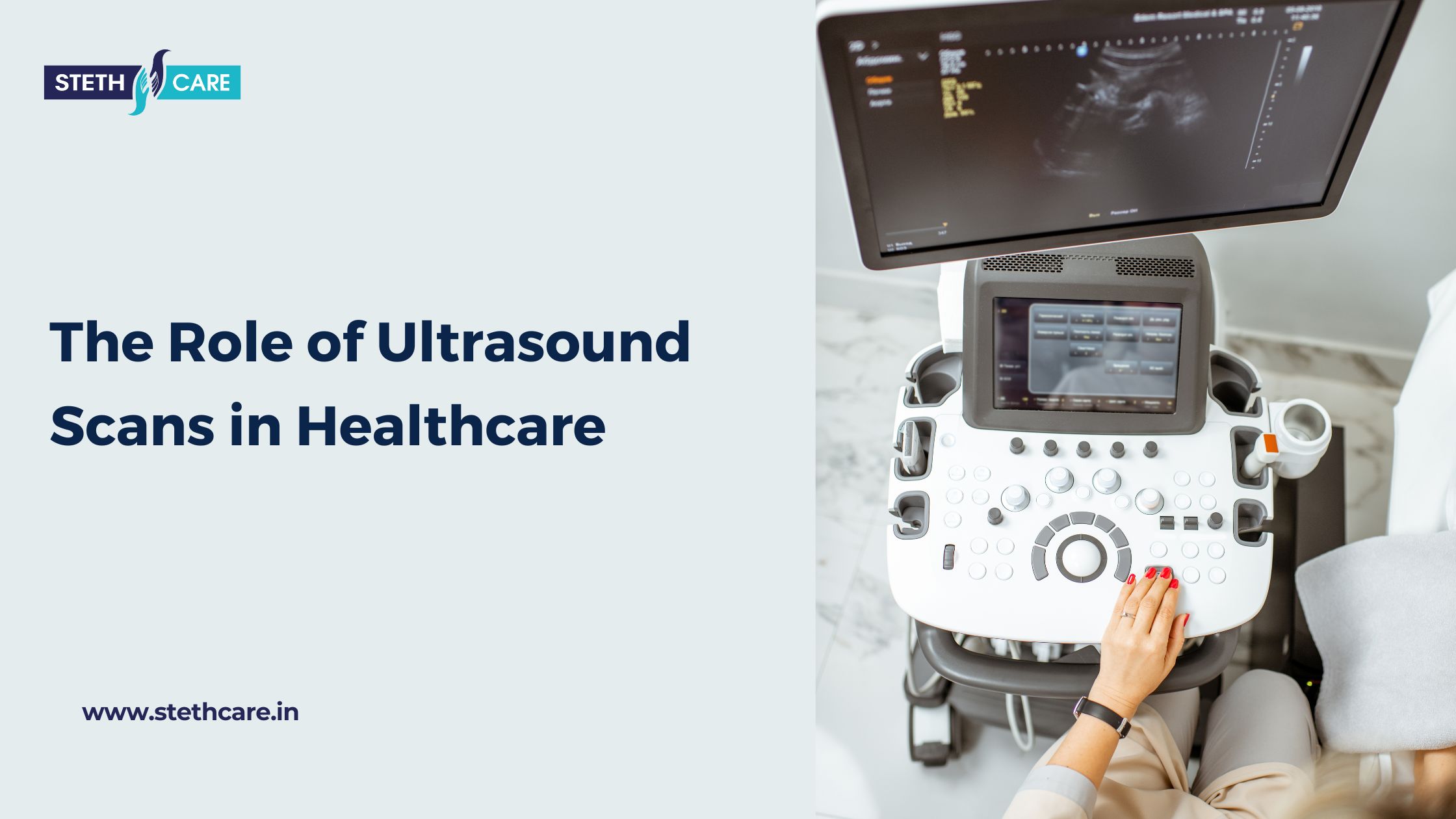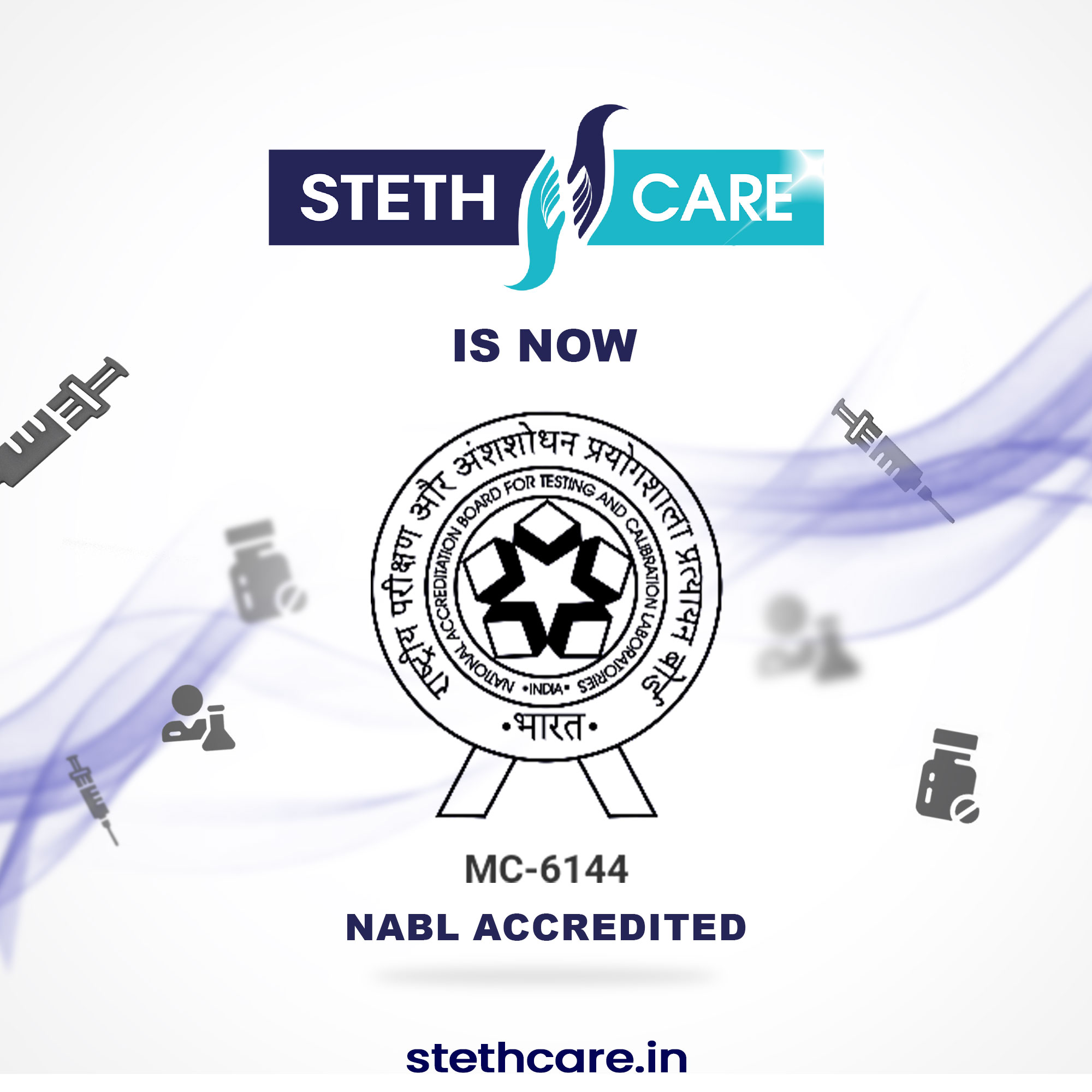
- Uncategorized
-
by yelleswari
Introduction
Ultrasound scans, also known as sonography, have revolutionized the field of healthcare by offering non-invasive imaging solutions that provide valuable insights into various medical conditions. At Stethcare Diagnostic Centre, we leverage the power of ultrasound technology to deliver accurate and timely diagnoses, empowering patients and healthcare providers alike. In this blog, we delve into the role of ultrasound scans in healthcare, highlighting their importance and applications across different medical specialties.
Understanding Ultrasound Technology
Principles of Ultrasound Imaging
Ultrasound imaging utilizes high-frequency sound waves to create detailed images of the body’s internal structures. These sound waves are emitted by a transducer and bounce off organs and tissues, producing real-time images that can be viewed on a monitor. The non-invasive nature of ultrasound makes it a preferred imaging modality in many healthcare settings.
Types of Ultrasound Scans
Ultrasound scans can be performed on various parts of the body, including the abdomen, pelvis, heart, blood vessels, and musculoskeletal system. Different types of ultrasound scans, such as abdominal ultrasound, obstetric ultrasound, and echocardiography, serve specific diagnostic purposes and provide valuable information to healthcare providers.
Applications of Ultrasound Scans in Healthcare
Diagnostic Imaging
Ultrasound scans play a crucial role in diagnosing a wide range of medical conditions, from abdominal disorders to pregnancy-related complications. They can detect abnormalities in organs such as the liver, kidneys, and gallbladder, as well as monitor fetal development during pregnancy.
Guidance for Medical Procedures
In addition to diagnostic purposes, ultrasound scans are used to guide various medical procedures, such as biopsies, injections, and surgeries. Real-time imaging provided by ultrasound helps healthcare providers precisely target the intended area, enhancing the safety and efficacy of procedures.
Monitoring Treatment Progress
Ultrasound scans are invaluable for monitoring the progress of certain medical treatments, such as cancer therapy or rehabilitation following musculoskeletal injuries. They allow healthcare providers to visualize changes in tissues and organs over time, guiding adjustments to treatment plans as needed.
Advantages of Ultrasound Imaging
Non-Invasive and Painless
One of the primary advantages of ultrasound imaging is its non-invasive nature, which eliminates the need for surgical procedures or radiation exposure. Patients undergoing ultrasound scans experience minimal discomfort, making it a preferred imaging option for individuals of all ages.
Real-Time Imaging
Ultrasound scans provide real-time imaging, allowing healthcare providers to observe dynamic processes within the body as they occur. This real-time feedback is particularly beneficial for procedures such as fetal monitoring during pregnancy or needle placement during interventions.
Portability and Accessibility
Ultrasound machines are relatively compact and portable, making them suitable for use in various healthcare settings, including hospitals, clinics, and even remote locations. This portability enhances accessibility to diagnostic imaging services, particularly in underserved or rural areas.
The Role of Stethcare Diagnostic Centre in Ultrasound Imaging
At Stethcare Diagnostic Centre, we are committed to leveraging advanced ultrasound technology to provide high-quality imaging services to our patients. Our experienced team of radiologists and sonographers utilize state-of-the-art equipment and techniques to deliver accurate and timely diagnoses, ensuring optimal patient care and outcomes.
FAQ’s
1. What is an ultrasound scan, and how does it work?
An ultrasound scan, also known as sonography, uses high-frequency sound waves to create images of the body’s internal structures. These sound waves are emitted by a transducer and bounce off organs and tissues, producing real-time images that can be viewed on a monitor.
2. What types of medical conditions can ultrasound scans help diagnose?
Ultrasound scans are versatile and can aid in diagnosing a wide range of medical conditions. They can detect abnormalities in organs such as the liver, kidneys, and gallbladder, as well as monitor fetal development during pregnancy and assess blood flow in the heart and blood vessels.
3. Are ultrasound scans safe for all patients, including pregnant women?
Yes, ultrasound scans are considered safe for patients of all ages, including pregnant women. Unlike other imaging modalities such as X-rays or CT scans, ultrasound does not use ionizing radiation, making it safe for both the patient and the developing fetus.
4. How long does an ultrasound scan typically take?
The duration of an ultrasound scan varies depending on the type of exam being performed and the specific area being imaged. Most ultrasound scans take between 20 to 60 minutes to complete and are generally painless.
5. Can ultrasound scans be used to guide medical procedures?
Yes, ultrasound scans are frequently used to guide various medical procedures, such as biopsies, injections, and surgeries. Real-time imaging provided by ultrasound helps healthcare providers precisely target the intended area, enhancing the safety and efficacy of procedures.
6. What are the advantages of ultrasound imaging compared to other imaging modalities?
Ultrasound imaging offers several advantages, including its non-invasive nature, real-time imaging capabilities, and portability. Unlike other imaging modalities such as MRI or CT scans, ultrasound does not require exposure to ionizing radiation, making it safe for repeated use and suitable for patients of all ages.
7. How can I schedule an ultrasound scan at Stethcare Diagnostic Centre?
Scheduling an ultrasound scan at Stethcare Diagnostic Centre is simple and convenient. You can contact us via phone or through our online portal to book an appointment at your preferred date and time. Our friendly staff will assist you in selecting the appropriate type of ultrasound exam based on your healthcare needs.
8. Are there any specific preparations I need to follow before undergoing an ultrasound scan?
Depending on the type of ultrasound exam being conducted, there may be specific preparation instructions provided to ensure optimal imaging quality. Common preparations may include fasting for certain abdominal exams or drinking water to fill the bladder for pelvic exams. Our team will provide detailed instructions when scheduling your appointment.
These FAQs provide valuable information about ultrasound scans and their role in healthcare. If you have any additional questions or require further clarification, please don’t hesitate to reach out to our team at Stethcare Diagnostic Centre. We are here to support you in your healthcare journey.
Conclusion
In conclusion, ultrasound scans play a pivotal role in modern healthcare, offering non-invasive imaging solutions that enable accurate diagnosis, precise treatment guidance, and monitoring of medical conditions. At Stethcare Diagnostic Centre, we harness the power of ultrasound technology to provide comprehensive diagnostic imaging services, empowering patients and healthcare providers with valuable insights into their health. By embracing innovation and excellence in ultrasound imaging, we strive to enhance the quality of patient care and contribute to improved health outcomes for all.
